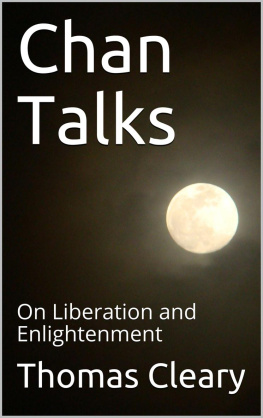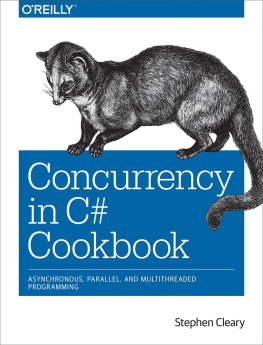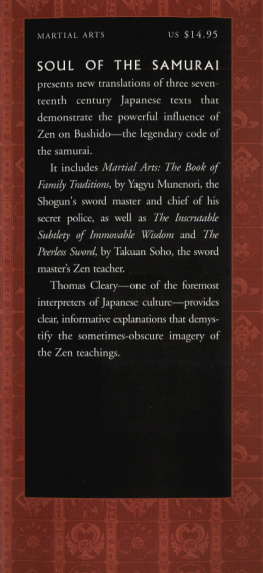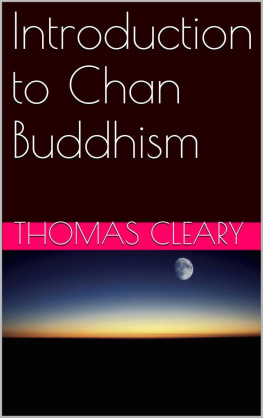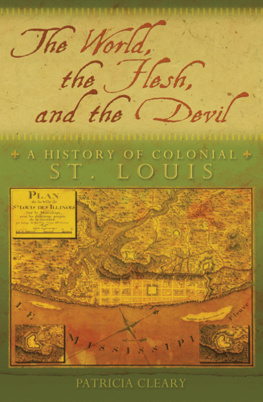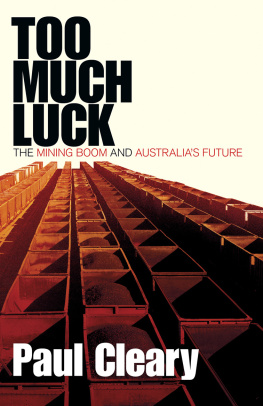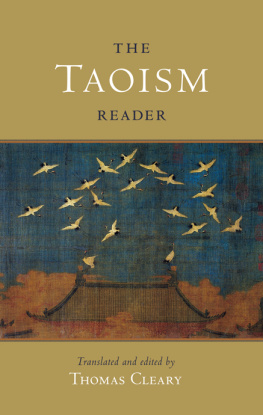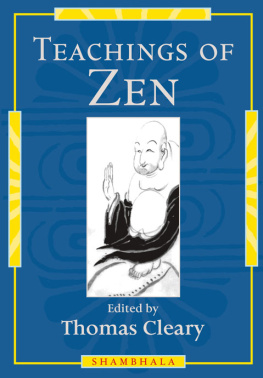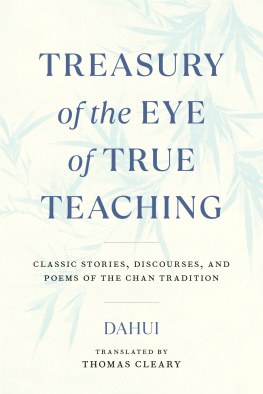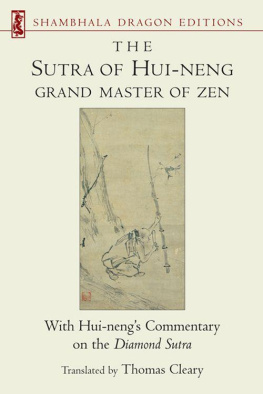Cleary - Chan Talks: On Liberation and Enlightenment
Here you can read online Cleary - Chan Talks: On Liberation and Enlightenment full text of the book (entire story) in english for free. Download pdf and epub, get meaning, cover and reviews about this ebook. genre: Religion. Description of the work, (preface) as well as reviews are available. Best literature library LitArk.com created for fans of good reading and offers a wide selection of genres:
Romance novel
Science fiction
Adventure
Detective
Science
History
Home and family
Prose
Art
Politics
Computer
Non-fiction
Religion
Business
Children
Humor
Choose a favorite category and find really read worthwhile books. Enjoy immersion in the world of imagination, feel the emotions of the characters or learn something new for yourself, make an fascinating discovery.
Chan Talks: On Liberation and Enlightenment: summary, description and annotation
We offer to read an annotation, description, summary or preface (depends on what the author of the book "Chan Talks: On Liberation and Enlightenment" wrote himself). If you haven't found the necessary information about the book — write in the comments, we will try to find it.
Cleary: author's other books
Who wrote Chan Talks: On Liberation and Enlightenment? Find out the surname, the name of the author of the book and a list of all author's works by series.
Chan Talks: On Liberation and Enlightenment — read online for free the complete book (whole text) full work
Below is the text of the book, divided by pages. System saving the place of the last page read, allows you to conveniently read the book "Chan Talks: On Liberation and Enlightenment" online for free, without having to search again every time where you left off. Put a bookmark, and you can go to the page where you finished reading at any time.
Font size:
Interval:
Bookmark:
Chan Talks
On Liberation and Enlightenment
Translated by Thomas Cleary
Introduction
Chan Buddhism emerged as one of the most effective and influential schools of Buddhism in China several centuries after the introduction of Buddhism into that country. Drawing freely on the whole range of Buddhist scriptures and treatises without adhering to any fixed system, Chan attracted a large following and eventually played a key role in the development of the Complete Reality school of neo-Taoism and the neo-Confucian movement known as the study of principle. The Chan talks translated here are of a genre known as general explanations introduced by masters of the Song dynasty (960-1278), when the great collections of Chan lore and case studies were compiled and elucidated by leading teachers of the age.
Chan approaches to the realization of mental liberation and enlightenment are best illustrated by its teachers. Mazu (709-788) said, The Way does not require cultivation; just dont defile it. What is defilement? As long as you have a fluctuating mind, artificiality, or compulsive tendencies, all of this is defilement. His successor Damei said, You should each individually clarify your own mind, getting to the root without pursuing the branches. Just get the root, and the branches come of themselves. If you want to get the root, just get to know your mind.
Baizhang (720-814), another successor of Mazu, said, Chan study is like washing a dirty garment. The garment is originally there; the dirt comes from outside.
The process of purification is to strip away influences of habit. If people in the process of purification cannot get rid of the diseases of greed and hostility they are as yet unhearing worldlings and still have to be taught to practice meditation and cultivate insight. Be master of mind, dont be mastered by mind. If anyone should say, I am capable of explaining, I am able to understand, I am the teacher, you are the disciples, this is the same as demonic suggestion and pointless talk.
Baizhangs successor Guishan (771-854) said, The mind of a wayfarer is plain and direct, without artificiality. There is no denial or inclination, no deceptive errant mental activity. At all times seeing and hearing are normal. There are no further details. And one does not shut the eyes or block the ears; as long as feelings dont stick to things, that will do. The sages since time immemorial have just explained the problems of pollution. If one does not have all that false consciousness, subjective views, and habits of thought, one is like an autumn pond, clear and still, pure and uncontrived, placid and uninhibited.
If one truly awakens and realizes the fundamental, one spontaneously knows when; cultivating or not cultivating is a dualistic expression. Now if beginners have conditionally attained a moment of sudden realization of inherent truth, but there are still longstanding forces of habit that they cannot yet clear away all at once, it is necessary to teaching them to clear away streaming consciousness manifesting habitual activity. This is cultivation, but that is not to say there is a particular method to practice or take to.
Xuefeng (822-908) said, You must perceive your essential nature in order to attain enlightenment. What is perceiving essential nature? It means perceiving your own original nature. What is its form? When you perceive your own original nature, there is no concrete object to see. Terms for the one mind are Buddha-nature, reality as such, the hidden essence, the pure spiritual body, the pedestal of awareness, the true soul, the innocent, universal mirror-like knowledge, the empty source, the ultimate truth, and pure consciousness.
Linji (d. 867) said, People who study Buddhas teaching in the present time should seek real true perceptive understanding for now. If you attain real true perceptive understanding, you are not affected by birth and death, free to leave or to stay. You dont need to seek anything extraordinarythe extraordinary will come of itself.
Followers of the Way, past worthies since olden times all had ways to develop people; as for what I point out to people, it just requires that you do not take on the delusions of others. If you need to act, then act, with no further hesitation and doubt.
When students today do not attain, where is the illness? The illness is in not trusting yourself, being turned around and changed by myriad objects, not attaining independence. If you can put to rest the mind that runs around seeking thought after thought, you will not be different from masters and Buddhas.
Do you want to know a master, a Buddha? It is just what is in your presence listening to the teaching. It is when students dont trust that they run seeking outside. Even if you find something, it is all verbal description of excellence; you never get the living meaning of the masters.
Linji also said, Followers of the Way, you urgently need to seek to attain real true perceptive understanding to go anywhere in the world freely and avoid being confused by the commonplace sprites. Just do not contrive; just be normal. When you try seeking elsewhere outside, searching for something extra, your standpoint and method are already mistaken. You just try to seek Buddha, but Buddha is a name, a termdo you know what it is that is running off searching?
The emergence of Buddhas and masters past present and future everywhere is just to seek truth. Followers of the Way now engaged in study also just do it to seek truth. Only when youve found truth are you finished. If you dont, you go round and round in mundane states as before.
What is the truth? The truth is the phenomenon of mind: the phenomenon of mind is formless, all-pervasive, presently functioning, evident in action right now. Because people dont trust enough, they then accept names and terms, seeking in writings, to figure out the Buddhas teaching conceptually. This is as far from it as the earth is from the sky.
Followers of the Way, what truth do my sermons expound? They expound the phenomenon of the ground of mind, which can enter into the ordinary and enter into the holy, can enter into purity and enter into pollution, can enter into the absolute and enter into the conventional, and yet is not your absolute or conventional, ordinary or holy, but is able to assign names to everything, absolute and conventional, ordinary and holy, while the absolute and conventional, ordinary and holy, cannot fix a label on this person. Followers of the Way, if you can, go ahead and use it, without attaching labels anymore, calling it mysticism.
Contents
Yuanwu
Gulin
Yuejiang
Faxian
Xueyan
Wumen
Pu-an
Yongjiao
Shiqi
Yuanwu
Just thisif you can take it up immediately, you are like the sky covering everywhere, like the earth supporting everywhere, with nothing at all lacking any more, and no second view. Even if every atom and every land in the whole infinite ocean of fragrant waters were to pierce your nostrils at once, it wouldnt come down anywhere else. If, on the other hand, you think about it and try to discuss it, then youre out of touch. Therefore it is said that when a single thought is not produced and before and after are cut off, this is called Buddha. If, however, you get involved in thought and make comparisons, distinguish subject and object, and produce intellectual interpretations, then youre a million miles away.
The school of the ancestral teachers just teaches that seeing must be true seeing, enlightenment must be true enlightenment, and realization must be true realization.
Each of you has a spiritual subtle essence. To tell you the truth, if you get flustered as soon as you are pressed, how can you see it intimately, trust it completely, and have the bottom fall out of the bucket? Just because your false ideas from beginningless time are thick, you just remain in the realm of sense objects and have never set foot on the scenery of your original ground and clearly seen your original face.
Next pageFont size:
Interval:
Bookmark:
Similar books «Chan Talks: On Liberation and Enlightenment»
Look at similar books to Chan Talks: On Liberation and Enlightenment. We have selected literature similar in name and meaning in the hope of providing readers with more options to find new, interesting, not yet read works.
Discussion, reviews of the book Chan Talks: On Liberation and Enlightenment and just readers' own opinions. Leave your comments, write what you think about the work, its meaning or the main characters. Specify what exactly you liked and what you didn't like, and why you think so.

